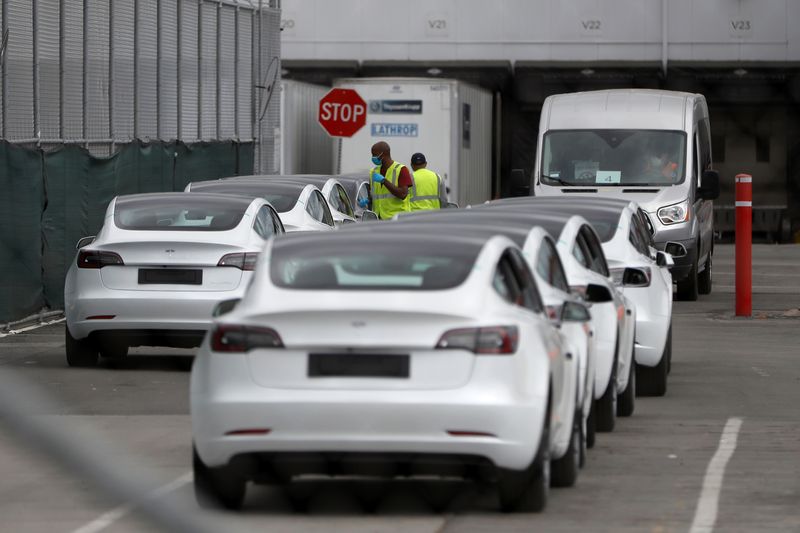
US unveils stricter EV tax credit rules, effective April 18
US unveils stricter EV tax credit rules, effective April 18 By Reuters
Breaking News
‘;
Stock Markets 8 hours ago (Mar 31, 2023 09:45PM ET)
(C) Reuters. FILE PHOTO: Workers walk among a row of Tesla Model 3 electric vehicles at Tesla’s primary vehicle factory after CEO Elon Musk announced he was defying local officials’ coronavirus disease (COVID-19) restrictions by reopening the plant in Fremont, Califor
By David Shepardson and David Lawder
WASHINGTON (Reuters) -The U.S. Treasury Department unveiled stricter electric vehicle tax rules on Friday that will reduce or remove tax credits on some zero-emission models but grant buyers another two weeks before the new requirements take effect.
The rules are aimed at weaning the United States off dependence on China for EV battery supply chains and are part of President Joe Biden’s effort to make 50% of U.S. new vehicle sales by 2030 EVs or plug-in hybrids.
The EV battery sourcing guidance issued on Friday triggers new requirements for critical minerals and battery components and takes effect for vehicle purchases starting April 18.
U.S. officials acknowledged some vehicles will see credits cut or eliminated. Tesla (NASDAQ:TSLA) said on Wednesday the Model 3 rear-wheel drive credit will be reduced as a result of the guidance. The government will publish by April 18 a revised list of qualifying models and tax credit amounts.
The $430 billion Inflation Reduction Act (IRA) signed by Biden in August eliminated manufacturers’ EV sales caps but imposed new conditions on EV credits. They included a North American assembly requirement from August, price and buyer income eligibility caps from Jan. 1, and now the battery and critical minerals sourcing rules, effective April 18.
Alliance for Automotive Innovation CEO John Bozzella said in a statement his best guess is “few” EVs on the market will qualify for the full $7,500 credit after April 17. He noted the requirement for EVs be assembled in North America to qualify for any credit eliminated 70% of models.
“Some EVs will certainly qualify for a partial credit. Given the constraints of the legislation, Treasury’s done as well as it could to produce rules that meet the statute and reflect the current market,” Bozzella said.
The IRA requires 50% of the value of battery components to be produced or assembled in North America to qualify for a $3,750 credit and 40% of the value of critical minerals sourced from the United States or a free trade partner also for a $3,750 credit.
Treasury proposes a three-step process for determining the value percentage of critical minerals and a four-step process for determining battery component value.
On Tuesday, the United States and Japan inked a trade deal on EV battery minerals. Treasury says newly negotiated critical minerals agreements can be considered free trade agreements. The guidance lists Japan as having a U.S. free trade deal.
The South Korean government welcomed the new rules, adding they reflected the opinion of the South Korean battery industry substantially and removed a “great deal of uncertainty”.
In a statement on Saturday, the country’s trade ministry said the government plans to hold further negotiations with the U.S. on the requirements of South Korean companies if necessary.
Senate Energy Committee chair Joe Manchin, a Democrat, said Treasury is ignoring the intent of the IRA in writing the guidance.
“American tax dollars should not be used to support manufacturing jobs overseas,” Manchin said. “It is a pathetic excuse to spend more tax payer dollars as quickly as possible and further cedes control to the Chinese Communist Party in the process.”
Treasury is not immediately issuing guidance on “Foreign Entities of Concern”, a provision due to start in 2024 barring credits if any components or minerals used in EV batteries are made in countries like China.
China has previously criticised EV related rules in the IRA, saying in September they could be violating WTO regulations.
Ford said in February it would invest $3.5 billion to build an EV battery plant in Michigan, using technology from Chinese battery company CATL.
Republican Senator Marco Rubio introduced legislation this month seeking to block EV tax credits for batteries produced using Chinese technology, saying it would “significantly restrict the eligibility of IRA tax credits and prevent Chinese companies from benefiting.”
The public will have until mid-June to comment on the proposed guidance.
US unveils stricter EV tax credit rules, effective April 18
Terms And Conditions
Privacy Policy
Risk Warning
Do not sell my personal information
(C) 2007-2023 Fusion Media Limited. All Rights Reserved.
Risk Disclosure: Trading in financial instruments and/or cryptocurrencies involves high risks including the risk of losing some, or all, of your investment amount, and may not be suitable for all investors. Prices of cryptocurrencies are extremely volatile and may be affected by external factors such as financial, regulatory or political events. Trading on margin increases the financial risks.Before deciding to trade in financial instrument or cryptocurrencies you should be fully informed of the risks and costs associated with trading the financial markets, carefully consider your investment objectives, level of experience, and risk appetite, and seek professional advice where needed.Fusion Media would like to remind you that the data contained in this website is not necessarily real-time nor accurate. The data and prices on the website are not necessarily provided by any market or exchange, but may be provided by market makers, and so prices may not be accurate and may differ from the actual price at any given market, meaning prices are indicative and not appropriate for trading purposes. Fusion Media and any provider of the data contained in this website will not accept liability for any loss or damage as a result of your trading, or your reliance on the information contained within this website.It is prohibited to use, store, reproduce, display, modify, transmit or distribute the data contained in this website without the explicit prior written permission of Fusion Media and/or the data provider. All intellectual property rights are reserved by the providers and/or the exchange providing the data contained in this website.Fusion Media may be compensated by the advertisers that appear on the website, based on your interaction with the advertisements or advertisers.

